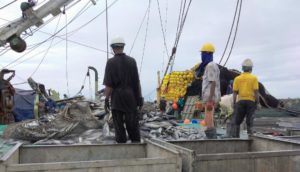Unavailability of anchovies affecting Tuna fishing – NAFAG
 The unavailability of adequate quantities of live anchovies as baits for fishing tuna is significantly affecting the operations of Pole and Line vessels, the National Fisheries Association (NAFAG) has said.
The unavailability of adequate quantities of live anchovies as baits for fishing tuna is significantly affecting the operations of Pole and Line vessels, the National Fisheries Association (NAFAG) has said.
The Association noted that the shortage of anchovy – a pelagic fish species used as bait to trap tuna, was increasingly becoming a challenge for pole and vessel operators which could render vessels inoperative and ultimately affect sustainable fishing if the situation persisted.
Mr Simon Agah, Acting President, NAFAG made this known during a monitoring visit by the Parliamentary Select Committee on Food, Agriculture and Cocoa Affairs to the Tema Fishing Harbour to access at first hand, operations at the fishing harbour.
The monitoring exercise afforded the Committee the opportunity to interact with producers and processors in the fishing industry and observe industrial fishing vessels discharging fish at the Tema Port.
Whiles explaining the use of anchovies in fishing tuna, he informed that “when a tuna bait-vessel sets of for a fishing expedition, it spends some time looking for and catching the bait that will be used in attracting the tuna and the anchovy is encircled and caught with special purse-seine nets.”
“The fish is taken alive with buckets and put into bait-wells located on the bait-boat and the operation of bait collection ends when all the bait wells on the vessels are filled with live bait. The tuna bait-boat then moves to the expected fishing grounds which may be anywhere in the Gulf of Guinea.”
He said in spite of efforts by the Managers and Regulators, the Fisheries Commission, Ghana Tuna Association, Ghana National Canoe Fishermen Council particularly the Volta Regional branch and others to salvage the situation, it was still very persistent.
“We, therefore, count on the cooperation of the Select Committee to join us in overcoming this particular challenge that has placed the pole and Line vessels in such a situation that if nothing is done immediately, those vessels would be rendered inoperative” he entreated.
Mr Agah further called on authorities, including the Parliamentary Committee to intervene and ensure the reduction in the current price of US$135.00 per Gross Registered Tonnage (GRT) for fishing license, which he described as rather high for the Tuna Sector particularly Pole and Line Vessels.
He said the catches of Pole and Line vessels had a higher premium over those harvested by purse seiners due to their methods of fishing considered more environmentally friendly and were yet unable to optimize their catches.
Within the last few months, he noted that the activities of pirates were posing as grave danger to the safety and security of fishermen and industrial vessels, particularly tuna vessels, within the country’s territorial waters.
According to him, his outfit had engaged stakeholders including the Multinational Maritime Coordinating Centre (MMCC – Zone F), the Ghana Navy, Ghana Maritime Authority to curb the criminal activities of pirates in the Gulf of Guinea, and further appealed to the Committee to add its clout to the ongoing efforts to salvage Ghanaian flagged vessels.
Mr Kwasi Etu-Bonde, Acting Ranking Member, Parliamentary Select Committee on Food, Agriculture and CocoaAffairs, speaking in an interview with the Ghana News Agency (GNA) said, the fishing industry was strategically important with great potential as it provided six per cent of animal protein needs of Ghanaians. The contribution of tuna in the foreign exchange earnings and Gross Domestic Product (GDP) of the country is also huge.
Mr Etu-Bonde, who is also the Member of Parliament for Kintampo North, said despite the myriad of challenges, the fishing sector employed 10 per cent of the Ghanaian population in the value chain, adding that the committee would ensure that policy interventions were advanced to ensure the sustainability of the sector.
Members of the Committee, who took a walk through the fish market and canoe beach to observe anchovies dried on the bare ground, called for a feasibility study to be conducted to fashion out an appropriate scientific innovation to dry anchovies in an even cleaner environment while still maintaining its otherwise scrummy taste.
Source: GNA
